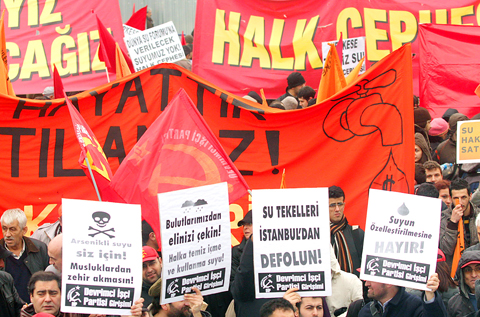Political leaders, specialists and activists were yesterday due to attend a vast gathering in Istanbul officially aimed at averting an impending world water shortage but denounced by critics as a front for multinational companies seeking profits and promoting privatization.
An estimated 20,000 delegates are expected at the world water forum, taking place on the banks of the Golden Horn and appropriately within sight of the Bosphorus, one of the world’s most famous waterways.
It is the fifth such forum organized by the Marseilles-based World Water Council, following previous events in Mexico, Holland, Japan and Morocco.

PHOTO: AFP
The council was founded to exchange ideas about conservation and the development of water resources. Group members include the World Bank, the International Committee of the Red Cross and the US Corps of Engineers.
“The water situation in the world is not going in the right direction,” said Ger Bergkamp, director general of the council. “There is a matter of urgency to act.”
This week’s gathering has been given added urgency by the global economic recession and climate change.
A Swiss-based environmental group, the International Union for the Conservation of Nature, has warned that two-thirds of the world’s population will face water shortages by 2025 resulting from demographic change and deteriorating ecosystems.
The five-day forum will highlight the damage done to developing world water and sanitation projects by the international credit crunch.
“The current economic meltdown has dried up the easy credit and trade that poorer nations have come to depend on. The [forum] will address this challenge, seeking to improve the quantity and quality of investments in water,” said a report on the council’s Web site.
However, that pledge is likely to heighten the suspicions of anti-forum pressure groups, some of which have dismissed the event as a “lords of water” jamboree.
“It’s organized to look like a UN-type event but it’s not,” said Maude Barlow, founder of the Blue Planet Project, a Canadian-based group dedicated to protecting fresh water.
“It’s really just a big trade show put on by the big water companies. There is going to be no mention of water as a human right,” she said.
“They don’t want to support that because they see water as a commodity to be sold on the open market. There is mounting evidence that privatisation has failed. We believe water should be a public trust,” Barlow said.
Critics promised demonstrations and were due to stage an alternative forum at Istanbul’s Bilgi University to promote public sector solutions.
They say that the council, aided by the World Bank, has driven projects that have raised water costs and worsened scarcities in the developing world.
There have also been complaints about the costs of attending. Turkish visa restrictions and a US$395 entrance fee have made the forum prohibitive for delegates from poorer countries.
“I think this forum is very hypocritical,” said Wenonah Hauter, of the US-based Food and Water Watch. “If the organizers were serious, the delegates would get in free and they also wouldn’t have held it in a city that’s very difficult to get to.”

REVENGE: Trump said he had the support of the Syrian government for the strikes, which took place in response to an Islamic State attack on US soldiers last week The US launched large-scale airstrikes on more than 70 targets across Syria, the Pentagon said on Friday, fulfilling US President Donald Trump’s vow to strike back after the killing of two US soldiers. “This is not the beginning of a war — it is a declaration of vengeance,” US Secretary of Defense Pete Hegseth wrote on social media. “Today, we hunted and we killed our enemies. Lots of them. And we will continue.” The US Central Command said that fighter jets, attack helicopters and artillery targeted ISIS infrastructure and weapon sites. “All terrorists who are evil enough to attack Americans are hereby warned

The death of a former head of China’s one-child policy has been met not by tributes, but by castigation of the abandoned policy on social media this week. State media praised Peng Peiyun (彭珮雲), former head of China’s National Family Planning Commission from 1988 to 1998, as “an outstanding leader” in her work related to women and children. The reaction on Chinese social media to Peng’s death in Beijing on Sunday, just shy of her 96th birthday, was less positive. “Those children who were lost, naked, are waiting for you over there” in the afterlife, one person posted on China’s Sina Weibo platform. China’s

‘POLITICAL LOYALTY’: The move breaks with decades of precedent among US administrations, which have tended to leave career ambassadors in their posts US President Donald Trump’s administration has ordered dozens of US ambassadors to step down, people familiar with the matter said, a precedent-breaking recall that would leave embassies abroad without US Senate-confirmed leadership. The envoys, career diplomats who were almost all named to their jobs under former US president Joe Biden, were told over the phone in the past few days they needed to depart in the next few weeks, the people said. They would not be fired, but finding new roles would be a challenge given that many are far along in their careers and opportunities for senior diplomats can

Seven wild Asiatic elephants were killed and a calf was injured when a high-speed passenger train collided with a herd crossing the tracks in India’s northeastern state of Assam early yesterday, local authorities said. The train driver spotted the herd of about 100 elephants and used the emergency brakes, but the train still hit some of the animals, Indian Railways spokesman Kapinjal Kishore Sharma told reporters. Five train coaches and the engine derailed following the impact, but there were no human casualties, Sharma said. Veterinarians carried out autopsies on the dead elephants, which were to be buried later in the day. The accident site